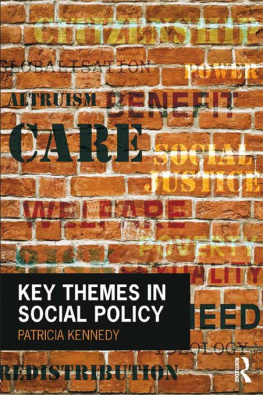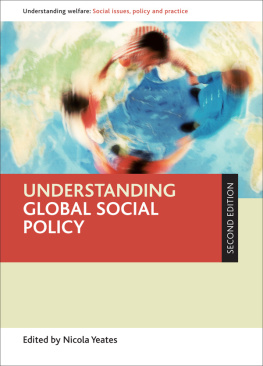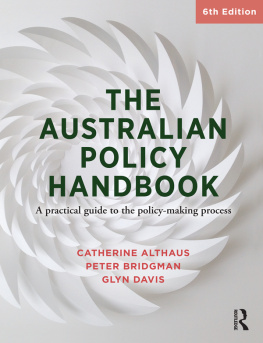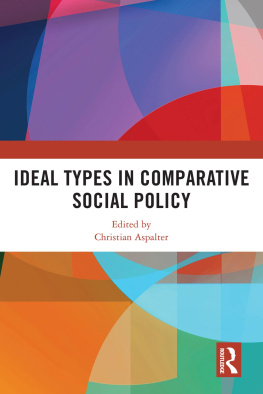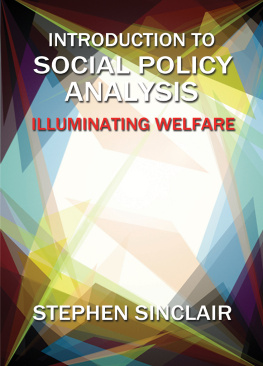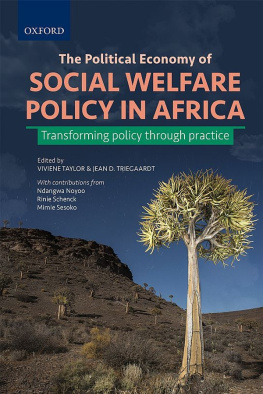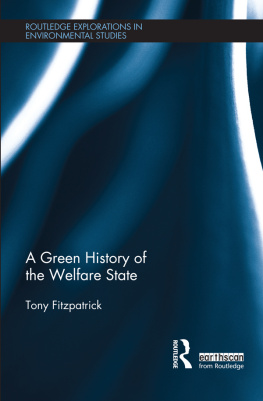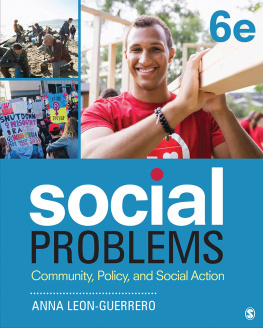
Talking Policy is an informative, insightful book that is also absorbing and challenging. It locates Australian social policy historically and internationally with the relevance of the authors critical approach well illustrated via discussion of three specific policy issues, mandatory detention, drugs and university fees. It should be read by all concerned with social policy. I recommend it highly, not only to students of social policy, but to practitioners and the public as well.
Lois Bryson, Emeritus Professor, University of Newcastle
Talking Policy is a profoundly insightful book, impressive in scope and compelling in rationale. In crisp and accessible prose it produces a lively account of the wide range of social policy and organisational contexts relevant to thinking about policy. With a commitment to reinvigorate policy debate, the authors make a convincing case that at its heart policy-making is about competing ethical visions, that ideas count, and that words serve as tools in this political and contested activity.
Associate Professor, Carol Bacchi, University of Adelaide
In memory of John (Jock) Robert Cameron (8 May 193114 July 2005)
First published 2006 by Allen & Unwin
Published 2020 by Routledge
2 Park Square, Milton Park, Abingdon, Oxon OX14 4RN
605 Third Avenue, New York, NY 10017
Routledge is an imprint of the Taylor & Francis Group, an informa business
Copyright Judith Bessant, Rob Watts, Tony Dalton and Paul Smyth, 2006
All rights reserved. No part of this book may be reprinted or reproduced or utilised in any form or by any electronic, mechanical, or other means, now known or hereafter invented, including photocopying and recording, or in any information storage or retrieval system, without permission in writing from the publishers.
Notice:
Product or corporate names may be trademarks or registered trademarks, and are used only for identification and explanation without intent to infringe.
National Library of Australia
Cataloguing-in-Publication entry:
Talking policy: social policy in Australia.
Bibliography.
Includes index.
ISBN 1 74114 518 X
1. Social policy. 2. Australia Social policy. I
Bessant, Judith. II. Title.
361.610994
Typeset in Centaur MT 12/15 pt by Midland Typesetters
ISBN-13: 9781741145182 (pbk)
We would like firstly to acknowledge the Australian Research Council who gave the four authors an ARC Discovery grant to undertake a major assessment of the social policy record of the HawkeKeating labor government, 19831996. This book could not have been written without the support of the ARC. Likewise we want to record our thanks and gratitude to the two fine young research assistants we employed on that project, Dr Janne Skinner and Dr James Rowe, who helped us do the archival work and to carry out an extensive array of interviews; without them the project would not have been finished in so timely or effective a fashion.
The authors would like to thank colleagues and students at their previous and current universities including RMIT University, Australian Catholic University, University of Queensland and the University of Melbourne.
Judith Bessant would like to thank Rebekah Bessant and Macgregor Bessant for their effective, if not always willing, role as morale boosters. Rob Watts would also like to thank his parents, whose services like endless tea sent to his caravan kept morale and output up.
A number of people read and commented on the text of this book at various stages in its gestation. We would especially like to thank Kate Driscoll, Bob Bessant and Lois Bryson for their various efforts in this way, though as ever all the sins of omission and commission are our responsibility.
Finally as ever we would like to thank Elizabeth Weiss at Allen & Unwin for her tireless and enthusiatic support for this project and for her insistence on the need for integrity. Alexandra Nahlous, also of Allen & Unwin was everything a senior editor should be including good humoured and persistent. Her insistence on clarity and coherence has helped make this book a better one.
absolute poverty A definition of poverty which assumes that there are absolute minimum needs for food, water and shelter without which life cannot be sustained, and which can be used to measure poverty. It is used in comparison with the idea of relative poverty.
abstraction An abstraction is the intellectual activity of identifying the logical or conceptual features of some real person, thing or situation. In sciences like physics the use of abstract conceptual systems like mathematics can help reveal underlying processes at work in the universe. It is less clear that mathematical processes help make sense of human or social matters leading social theorists like Max Weber to advocate the use of ideal types.
advocacy Advocacy refers to any kind of action intended to support or change policy. It typically involves influencing peoples ideas both formally and informally by working with individuals, groups or the whole community and frequently involves media strategies. Advocacy involves strategic thinking, an ability to think ahead and act in well considered purposeful ways. It can be achieved as an insider operating within an organisation, or as an outsider. It can also involve working in a small group, a political party or as part of a larger social movement like a union or social interest movement.
ageism A form of discrimination that relies on negative assessments of a persons age, and is particularly directed against children, young people and the elderly.
agency The word used by many modern sociologists to communicate the idea that society or other forces do not manipulate us like puppets. The idea of human agency refers to our capacity to be self-aware, to know what we are doing, to give good accounts of why we have done what we have done, and our will to act. Some social scientists argue that we are self-interpreting, symbolic and expressive creatures, who are rational because we seek to direct, interpret, monitor and change our activities, and that we do so mostly in the context of relationships with other similiarly equipped creatures. It is often used in opposition to the idea of structure.
bureaucracy A hierarchical form of organisation. Weber said that modern societies were dominated by bureaucracies. Bureaucracies rely on written rules for defining and managing the work of officials, who work in formal roles. They are staffed by full-time officials, whose work is said to be characterised by a high degree of uniformity and predictability.
capitalism An economic order based on the private ownership of productive wealth and the fact that large numbers of people have to sell their labour in order to live. Historically, capitalism involves making more and more things and activities into commodities which can be bought and sold, including labour itself and services (education or child care) as well as things like food or clothing. Capitalist economies are characterised by extreme inequality in regard to income and wealth, and by dynamic change and growth.
citizen


